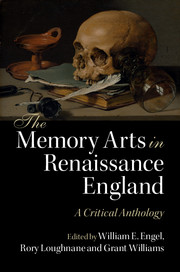Book contents
- Frontmatter
- Dedication
- Contents
- List of figures
- Acknowledgements
- A note on abbreviations
- Introduction
- PART I The art of memory
- Introduction to Part I
- I.1 Stephen Hawes, The Pastime of Pleasure (1509)
- I.2 [Laurence Andrewe], The Mirror of the World (1527)
- I.3 Peter of Ravenna, The Phoenix (1548)
- I.4 Guglielmo Gratarolo, The Castle of Memory (1562)
- I.5 Hugh Plat, The Jewel House of Art and Nature (1594)
- I.6 William Basse, A Help to Memory and Discourse (1620)
- I.7 John Willis, The Art of Memory (1621, 1661)
- I.8 Henry Herdson, Ars memoriae; the Art of Memory Made Plain (1651)
- I.9 Richard Saunders, Art of Memory (1671)
- I.10 Marius D'Assigny, The Art of Memory (1697)
- PART II Rhetoric and poetics
- PART III Education and science
- PART IV History and philosophy
- PART V Religion and devotion
- PART VI Literature
- Index
- References
I.1 - Stephen Hawes, The Pastime of Pleasure (1509)
from PART I - The art of memory
Published online by Cambridge University Press: 05 August 2016
- Frontmatter
- Dedication
- Contents
- List of figures
- Acknowledgements
- A note on abbreviations
- Introduction
- PART I The art of memory
- Introduction to Part I
- I.1 Stephen Hawes, The Pastime of Pleasure (1509)
- I.2 [Laurence Andrewe], The Mirror of the World (1527)
- I.3 Peter of Ravenna, The Phoenix (1548)
- I.4 Guglielmo Gratarolo, The Castle of Memory (1562)
- I.5 Hugh Plat, The Jewel House of Art and Nature (1594)
- I.6 William Basse, A Help to Memory and Discourse (1620)
- I.7 John Willis, The Art of Memory (1621, 1661)
- I.8 Henry Herdson, Ars memoriae; the Art of Memory Made Plain (1651)
- I.9 Richard Saunders, Art of Memory (1671)
- I.10 Marius D'Assigny, The Art of Memory (1697)
- PART II Rhetoric and poetics
- PART III Education and science
- PART IV History and philosophy
- PART V Religion and devotion
- PART VI Literature
- Index
- References
Summary
About the author
Stephen Hawes (b. c. 1474, d. before 1529) was a celebrated court poet and Groom of the Chamber to Henry VII. The English antiquary Anthony à Wood reports that Hawes was ‘highly esteemed by [Henry VII] for his facetious discourse and prodigious memory’ (Athenae Oxonienses, vol. 1 (London, 1691), B2r).
About the text
The Pastime of Pleasure is a long allegorical poem, written in rhyme royal and couplets. It was first composed in 1505–6 and published in 1509. Hawes includes a prefatory dedicatory poem to Henry VII. The poem tells the tale of Graunde Amoure's courtship of La Belle Pucelle. Wood notes that when the text was first printed ‘it is adorned with Wooden Cuts to make the reader understand the story the better and printed in an old English Character’. It certainly attracted a wide readership in the sixteenth century, and was reprinted in 1517, 1554 and 1555. But, Wood laments, ‘such is the fate of poetry, that this book, which in the time of Henry VII and VIII was taken into the hands of all ingenious men, is now thought but worthy of a ballad-monger's stall’ (B2r).
The arts of memory
In preparation for his love quest, Amoure receives instruction in the Seven Liberal Arts at the Tower of Doctrine. Chief among the Arts is rhetoric, and Amoure learns (from Dame Rhetoric) that he must master the five parts of this discipline: invention, disposition, elocution, pronunciation and memorative (see Introduction). He is told that ‘retentive memory…must ever aggregate / All matters thought’ (D1v). In the poem's extended discussion about memory excerpted below, which evidently draws on the pseudo-Ciceronian Rhetorica ad Herennium, Hawes describes how an orator or poet can use a ‘memorial art’ of ordered signifying images to recall and deliver his speech in ‘due order, manner, and reason’. Hawes readily admits that the technique is ‘obtuse’ and suggests that the student of rhetoric ‘exercises’ the technique.
Textual notes
This excerpt is taken from John Wayland's 1554 reprinting. Stephen Hawes, The historie of graunde Amoure and la bell Pucel, called the Pastime of plesure (London, 1554; first published 1509), F2r–F3r.
- Type
- Chapter
- Information
- The Memory Arts in Renaissance EnglandA Critical Anthology, pp. 39 - 41Publisher: Cambridge University PressPrint publication year: 2016



